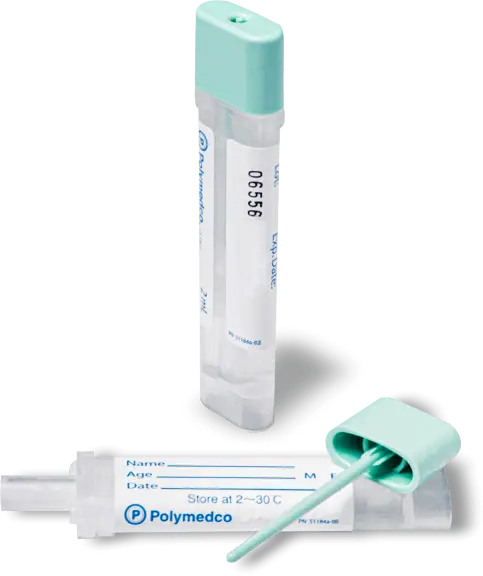CheckIt4Andretti is proud to collaborate with Polymedco, the producer of OC-Auto FIT and a fellow partner in the mission to enhance access to screening. By promoting yearly FIT, Polymedco is working to make screening more effective, accessible, and affordable.
THE IMPORTANCE OF SCREENING
What is colon cancer?
Colon cancer starts as a small growth in the lining of the colon or rectum. Regular screening is important to make sure colon cancer is caught as early as possible.
Colon cancer facts and figures:
Colon cancer has the second-highest death rate among cancers overall and is the leading cause of cancer death in men under 5o.1
- More than 150,000 people are diagnosed with colon cancer annually1,2
- More than 50,000 people are estimated to lose their lives to colon cancer annually1,2
- Nearly 20,000 annual colon cancer diagnoses are estimated in people younger than 501
90% of all colon cancer deaths are preventable if caught early3, but over 4 in 10 adults are not getting screened as recommended.1
- While rates of colon cancer have been increasing in individuals younger than 55, screening rates remain lowest among people 45-49 years of age.1
Over 40% of adults are not getting screened per current recommendations.1
Who should get screened for colon cancer?
For adults ages 45-75 at average-risk, guidelines from leading professional organizations including the US Preventive Services Task Force, American College of Gastroenterology, and US Multi-Society Task Force on Colorectal Cancer recommend screening with fecal immunochemical testing (FIT) every year. 4-6

What is FIT?
FIT is a noninvasive colon cancer screening solution that identifies blood in the stool or bleeding in the digestive tract that may have no other signs or symptoms.
OC-Auto FIT, the brand name of the #1 automated noninvasive colon cancer screening solution in the world,7 is an easy option that can be performed from the comfort of your home and offers annual screening as recommended by experts.4-6
This screening guidance applies to all average-risk adults aged 45-75
WHAT YOU CAN DO TO PROTECT YOURSELF FROM COLON CANCER
- Know your risk
While some people may have more risk factors than others, no one is considered “low-risk” when it comes to colon cancer.
Many people with early-stage colon cancer have no symptoms,3 and many colon cancers occur in people with no known risk factors or family history.8,9
- 3 in 4 people with colon cancer have no known risk factors8
- 2 in 3 people with colon cancer have no family history9
- 2. Screen with OC-Auto FIT every year
Even if you are in generally good health or have no family history, experts suggest all adults 45-75 at average-risk screen annually with OC-Auto FIT4-6 to help find signs of the disease before symptoms appear, allowing patients to get treatment early, and when survival rates are higher.
OC-Auto FIT:
- Checks for disease every year
- Detects non-visible blood in the stool
- Is noninvasive and performed at home
By making annual screening a part of your yearly physical visits, earlier detection can become part of your regular care. That’s why OC-Auto was designed to be patient-friendly, simple to use, and available at little or no cost.
CheckIt4Andretti is proud to join Polymedco in closing the gaps in screening rates by increasing access to guideline-recommended screening solutions.
With CheckIt4Andretti’s mission to expand colonoscopy access and Polymedco’s commitment to accessible, annual at-home screening, we are working together to ensure every American has access to effective, affordable screening options.
Read more about the top recommended colon cancer screening options.
Learn more about CheckIt4Andretti’s mission.
References
- Colorectal cancer facts & figures 2023-2025. American Cancer Society. Accessed January 25, 2023. https://www.cancer.org/content/dam/cancer-org/research/cancer-facts-and-statistics/colorectal-cancer-facts-and-figures/colorectal-cancer-facts-and-figures-2023.pdf
- Cancer facts & figures 2024. American Cancer Society. Accessed February 7, 2024. https://www.cancer.org/content/dam/cancer-org/research/cancer-facts-and-statistics/annual-cancer-facts-and-figures/2024/2024-cancer-facts-and-figures-acs.pdf
- Tepus M, Yau TO. Non-invasive colorectal cancer screening: an overview. Gastrointest Tumors. 2020;7(3):62-73. doi:10.1159/000507701
- US Preventive Services Task Force, Davidson KW, Barry MJ, et al Screening for colorectal cancer: US Preventive Services Task Force recommendation statement. JAMA. 2021;325(19):1965-1977. doi:10.1001/jama.2021.6238
- Shaukat A, Kahi CJ, Burke CA, et al ACG clinical guidelines: colorectal cancer screening 2021. Am J Gastroenterol. 2021;116(3):458-479. doi:10.14309/ajg.0000000000001122
- Rex DK, Boland CR, Dominitz JA, et al Colorectal cancer screening: recommendations for physicians and patients from the U.S. Multi-Society Task Force on colorectal cancer. Am J Gastroenterol. 2017;112(7):1016-1030. doi:10.1038/ ajg.2017.174
- Data on file with Polymedco, Inc.
- Who is at risk for colon cancer? Colon Cancer Coalition. September 22, 2022. Accessed January 12, 2024. https://coloncancercoalition.org/get-educated/what-you-need-to-know/who-is-at-risk/
- Colorectal cancer risk factors: hereditary colorectal risk factors. American Cancer Society. Accessed January 12, 2024. https://www.cancer.org/cancer/types/colon-rectal-cancer/causes-risks-prevention/risk-factors.html
0 Comments